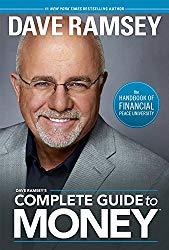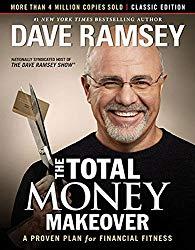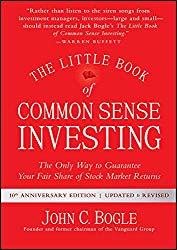In some of the funniest radio I’ve heard in a long time, Dave Ramsey (of the Dave Ramsey Show) responded to an emailer’s question, in which the caller asked what she should do with her BP shares, now that they have declined. He screamed into the radio, to paraphrase, “I don’t buy single stocks, because you never know when the company you buy will dig a hole into the bottom of the ocean and kill everything in the vicinity!!!”
For those who don’t know, Dave Ramsey is the author of a series of books and the host of a popular radio show. The theme of the show and the books is getting out of debt and generally getting your financial house in order. He calls this state, financial peace. Clips can be heard at his website, http://www.daveramsey.com/radio/home/ . He offers great advice on setting yourself up into a position where you can start investing and growing wealth (by getting rid of all of your debt and spending less than you make so you can invest). The also has some great books on personal finance, including Dave Ramsey’s Complete Guide To Money
(Note, this site contains affiliate links. When you click on an affiliate link and buy something, The Small Investor will get a small commission for the referral. You are charged nothing extra for the purchase. This helps keep The Small Investor going and free. I don’t recommend any products I do not fully support. If you would like to help but don’t see anything you need, feel free to visit Amazon through this link


Note that if you’ve already followed Dave’s advice and have already reached financial peace, check out
FIREd by Fifty: How to Create the Cash Flow You Need to Retire Early where I give you information on how to develop a cash flow plan to build wealth to reach financial independence. This is the state where you have enough income coming in from investments to pay for everything you need.
Dave doesn’t do individual stocks
Mr. Ramsey’s shuns individual stocks. His investing style is to buy mutual funds. Specifically, he spreads his investments over index mutual funds in the categories of growth, growth and income, aggressive growth, and international. He does not buy individual stocks because he believes the risk to be too great. And as he said, you never know what will happen with any one stock you own. It may actually drill a hole in the bottom of the ocean. Or it may just really misread demographics and see earnings implode. If you want to learn more about index mutual funds and how to use them, check out
The Little Book of Common Sense Investing: The Only Way to Guarantee Your Fair Share of Stock Market Returns
While I do not agree that mutual funds are the only way to go, ownership of only one stock is not advisable, and the number of stocks owned should grow as one’s tolerance for risk declines. To invest in individual stocks, one must understand their behavior and plan accordingly. The price of individual stocks changes rapidly, and sometimes for no good reason. The current price offered reflects people’s feelings about the near-term prospects for the future, what the market is doing, what people expect others to do, where other investments are priced, other events in people’s lives, and recent movements in price. One cannot buy a stock and expect 10% to be added to their bank account year after year just like a savings account. Some years it will double, other years it will fall by 50%. Some years it will move up or down by 2%. Bad things do happen to good companies as well, and sometimes individual stocks fall rapidly in price, sometimes never to recover.

Because of this, placing large amounts in only one stock or even just a few stocks is foolish. There were many retirees from GE who watched their life savings implode along with the price of GE stock during the last recession. If you have large sums of money, you should spread it out over a number of stocks, and even into different sectors and asset categories (stocks, bonds, treasuries, etc…).
Concentration can work for non-retirement accounts
For those who do not have a lot of money, however, concentration in a few stocks can be a good thing. If one is a fairly good stock picker, or even picks one huge winner out of five, one can do very well. The difference is that if one has a lot of money, the risk of losing a large sum outweighs the potential rewards that can be gained through concentration. If one only has a small sum to invest, however, it is worth the risk of suffering a loss. If one only has $1000 and it grows at 10% per year, one would only have $2000 after 7 years. It is worth the risk of losing the $1000 for the potential to have $10,000 after those same seven years.
That said, you should be contributing to retirement accounts like 401Ks (10-15% of your paycheck if you want to be assured of a comfortable retirement) and investing that money in mutual funds. You don’t want to risk your retirement on your stock picking. You also want to start diversifying into mutual funds as your portfolio value grows. As some of your positions get large, sell a few shares and buy shares in a fund to start to protect your gains. The greater the portion of your portfolio that you have in mutual funds, the less volatility (meaning how much your portfolio value moves up or down) you’ll see. You’ll also be reducing your potential rate of return, however, so holding onto a few single stocks is often worth the risk. Hopefully, you’ll do so well that while the percentage of individual stocks you own declines as you get older, the absolute value will stay the same or even grow because your portfolio will just get that much larger than when you started.
My rules for individual stock positions
Here are the rules I generally use in determining the maximum size of individual stock positions:
1. Never have more in one position then you are willing to lose. If you cannot afford a loss of $1000, you do not belong in individual stocks. Very few people (except multi-millionaires) could afford to lose $100,000, so positions that grow so large should be split up into smaller positions.
2. On the other hand, make sure positions are large enough that if one is right about a stock, one make’s a good profit. It does no good to be right about a stock that goes from $20 to $40 if one only has $500 invested since only $500 will be made. Make sure to take large enough positions so that your winners will result in a large return.
3. The more money you have, and the shorter your time horizon, the more diversification you should have. If you have a significant amount of money, or if you do not have much time to recover from a setback, your level of risk should drop. A person who will retire in five years and plans to live off of his savings should not have his money invested such that a drop in a few stocks would affect his plans.
4. Have money that is really needed in the next five-ten years in cash. Again, if you will be retiring soon, there is nothing like having enough to live on for five years in cash. It was sad to hear of so many putting off retirement because of the recent recession. These individuals should have been sitting on a pile of cash such that they could care less about the stock market drop.
So how many stocks should I have?
Based on the rules above, I tend to grow stock positions until I have around $25,000 invested in any given stock. I wouldn’t want to lose $25,000, but it would not be the end of the world. If the stock doubles, I will now have made $25,000 – enough to have a significant impact on my life since it would pay for a year of college expenses, a new car, or a bathroom remodel. Based on this, here are the number of stock positions I would own. (Note that this may not be right for you, depending on your situation and tolerance for seeing your portfolio value fluctuate.)
Account Value Number of stocks
$50,000 3
$100,000 4
$250,000 8
$500,000 10
$1,000,000 20
Note that as account values increased, I went ahead and increased the amount I have in each position to around $50,000 since now, a $50,000 loss would only by 5-10% of my total portfolio. I would also start shifting some money into index funds as the account value grew, so with $1 M I might have $750,000 in 20 individual stocks and about $250,000 in index mutual funds.
Still need more help? In the SmallIvy Book of Investing: Book 1: Investing to Become Wealthy I lay out a strategy I call Serious Investing which uses long-term investing in concentrated positions as a way to grow wealth

Have a burning investing question you’d like answered? Please send to [email protected] or leave in a comment.
Follow on Twitter to get news about new articles. @SmallIvy_SI
Disclaimer: This blog is not meant to give financial planning or tax advice. It gives general information on investment strategy, picking stocks, and generally managing money to build wealth. It is not a solicitation to buy or sell stocks or any security. Financial planning advice should be sought from a certified financial planner, which the author is not. Tax advice should be sought from a CPA. All investments involve risk and the reader as urged to consider risks carefully and seek the advice of experts if needed before investing.
